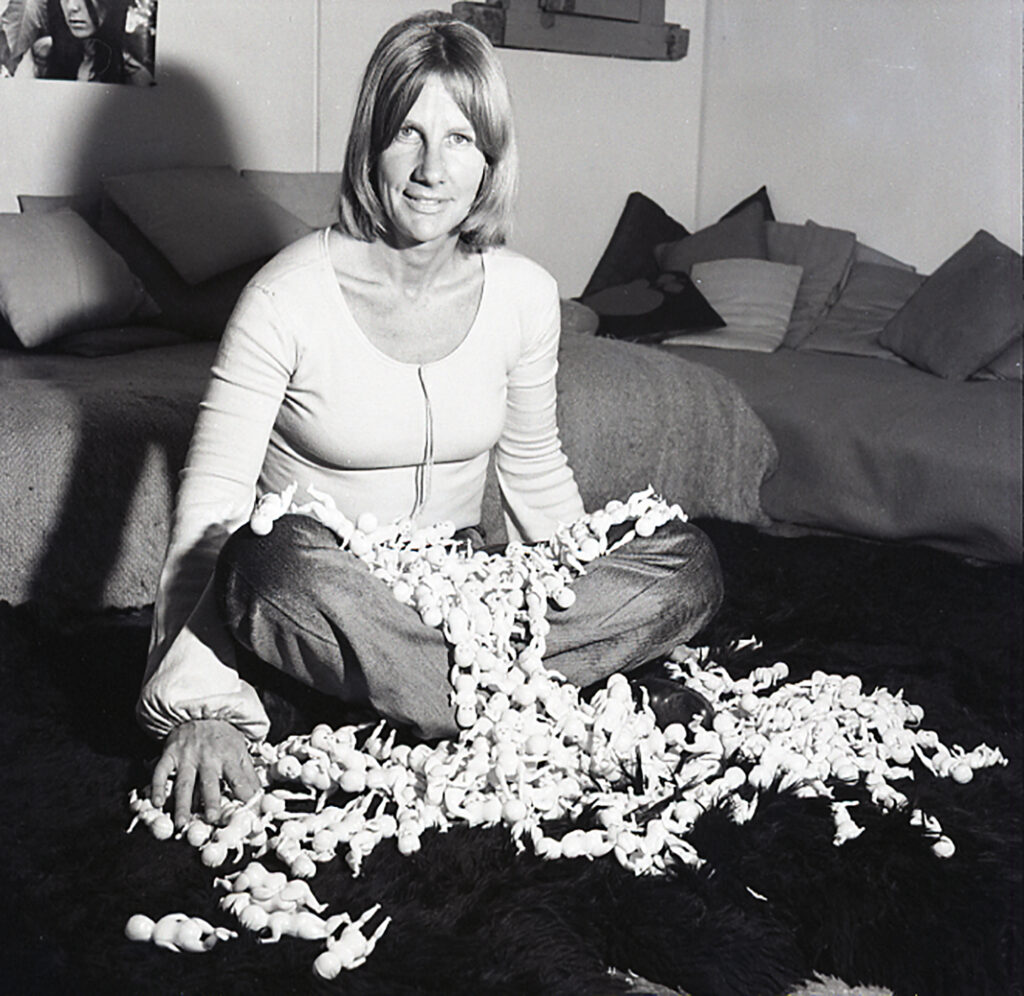Sunday November 17, 4pm ET
Narcisa Hirsch: A conversation with Tomas Rautenstrauch, Andrée Hayum, and Susana Balán
Live-streamed on this page
The conversation begins at 4pm ET approx. If not visible, please reload the page.
Q&A with the audience online

Microscope is very pleased to present a conversation about the life and work of Argentine artist and filmmaker Narcisa Hirsch in connection with her current solo exhibition “On the Barricades” at the gallery. Hirsch died at the age of 96 this past May during the planning of the show, which is on view through November 30th. The event is taking place online and will be live-streamed on Sunday November 17 at 4pm ET on this page of our website. Admission is free.
The three participants joining the discussion offer unique perspectives and knowledge of the artist through both their personal relationships with Hirsch and their professional experiences. Tomas Rautenstrauch, the artist’s grandson, is a filmmaker and the head of the Filmoteca Narcisa Hirsch in Buenos Aires; Andrée Hayum, the artist’s niece, is an art historian in New York City; and Susana Balán, an early collaborator and a good friend of Hirsch’s in Argentina, is now a psychotherapist based in upstate New York.
The talk will focus on and provide additional background and contextual information about her early experimental films and photographic works on view — which range in approach from formal, to diaristic, to performative — and dealing with themes such as love and eroticism, the female gaze, structuralism, mortality, and friendship, among others. Her photographic series “Graffitis” documents her own graffiti interventions on the walls of Buenos Aires, which were otherwise empty because of the repression of the military dictatorship in power in the late 1970s and early 1980s.
Hirsch’s connections to the city of New York, which she frequently visited, will also be explored.
Further information about Narcisa Hirsch’s solo exhibition “On the Barricades” can be found HERE.
_
Tomas Rautenstrauch (Buenos Aires, 1976) studied Cinema and Art History at Concordia University in Montreal. He worked and lived in France for 8 years, as assistant producer for film and TV. Back in Argentina, he joins ZavaletaLab Art Gallery. He was selected for the Di Tella post graduate University Art Programme in 2012. His video works and installations were shown in venues around Argentina, Europe, and United States. In 2019, together with Narcisa Hirsch, he starts the Filmoteca Narcisa Hirsch, a space for preserving and distributing Narcisa’s works, which also serves as a meeting point for fellow filmmakers, academics and researchers dealing with experimental cinema. Rautenstrauch lives and works in Buenos Aires.
Andrée Hayum is Professor Emerita, Fordham University. Her Harvard dissertation: Giovanni Antonio Bazzi – “Il Sodoma” (Garland series), was followed by a later monograph on Grünewald’s Isenheim Altarpiece, recipient of the CAA’s Charles Rufus Morey Award. Articles on individual examples – Michelangelo’s Doni Tondo, Dürer’s engraving of Erasmus, Andrea del Castagno’s Last Supper – illuminate key aspects of their original cultural contexts. More recent studies explore the idea of the Renaissance in terms of the institution that marks the modern era: the public museum and special exhibitions that accompany its development. Support has come from the NEH, Fulbright Commission, ACLS and the Metropolitan Museum.
Susana Balán is an Argentine psychotherapist with clients throughout the Americas. She holds a degree in psychology from the National University of Buenos Aires and was trained in clinical psychology, social psychology, and psychoanalysis with Enrique Pichon-Rivière, a founder of Argentine psychoanalysis. She continued her training in Brazil at the Sociedade de Psicanálise Iracy Doyle in Rio de Janeiro. Balán is widely recognized in Argentina and Brazil for her clinical work and publications, which include five books focused on female identity, couple ́s relationships, and the nature of love. Since 1998, she has have lived and worked in the New York area.
Narcisa Hirsch (Berlin, Germany 1928 – Bariloche, Argentina 2024) was the grande dame of Argentine experimental film. Today, many younger filmmakers in her home country, with whom she maintained an active exchange, consider her work to be a point of reference. Hirsch was born Narcisa Heuser in Berlin in 1928, the daughter of a German-Argentinean mother and the expressionist painter Heinrich Heuser. In 1937, she immigrated to Argentina with her mother via Vienna. Originally working as a painter, her interest in film arose during the documentation of collaborative public performances and happenings undertaken in the streets of Buenos Aires, New York, and London. Hirsch has completed 50+ films since the mid-1960s. Thematically, her films often deal with women, bodies, death, but also with the very personal cinematic appropriation of landscapes. Her films have been the subject of major retrospectives at venues including Viennale (2012, 2023), MoMA (2024), Media City Film Festival (2023), s8 Festival de Cine Periferico (2024). She is the author of several books including “Philosophy Is a Useless Passion” (2015). The Filmoteca Narcisa Hirsch was established in 2019 to preserve her films and provide a cultural space for artists’ film in Buenos Aires. She was active as a filmmaker until the very end of her life, and her great influence on the following generations will remain. She lived and worked between Buenos Aires and Patagonia.
